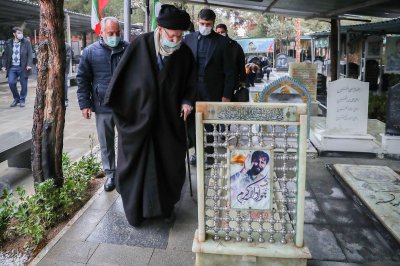Topic: Ayatollah Ruhollah Khomeini
Quotes
We did not create a revolution to lower the price of melons
U.S. urged to contain Iran with Gulf coalition strategy Dec 15, 2008
We will witness the destruction of this regime in the near future
Iranian president says Israel will fall Jun 03, 2007
We must bear in mind that not everyone is our enemy
Iran's clerics critical of top leader Mar 16, 2007
Grand Ayatollah Sayyed Ayatollah As-Sayyid Ruhollah Mostafavi Musavi Khomeini (Persian: روحاللّه مصطفوی موسوی خمینی, Persian pronunciation: , 24 September 1902 – 3 June 1989) was an Iranian religious leader and politician, and leader of the 1979 Iranian Revolution which saw the overthrow of Mohammad Reza Pahlavi, the Shah of Iran. Following the revolution and a national referendum, Khomeini became the country's Supreme Leader—a position created in the constitution as the highest ranking political and religious authority of the nation—until his death.
Khomeini was a marja ("source of emulation", also known as a Grand Ayatollah) in Twelver Shi'a Islam and like other senior shi'a clerics has written many books, but is most famous for his political role. In his writings and preachings he expanded the Shi'a Usuli theory of velayat-e faqih, the "guardianship of the jurisconsult (clerical authority)" to include theocratic political rule by the Islamic jurists.
He is the author of more than 40 books mainly on mysticism, philosophy, and Islamic jurisprudence most of which were written before revolution. After his death, a book of poetry was published under his name. He was arrested in 1963 for 10 months and banished in 1964 for near 15 years for his speeches against the Capitulation (treaty) approved by the Shah regime.
It uses material from the Wikipedia article "Ayatollah Ruhollah Khomeini."














